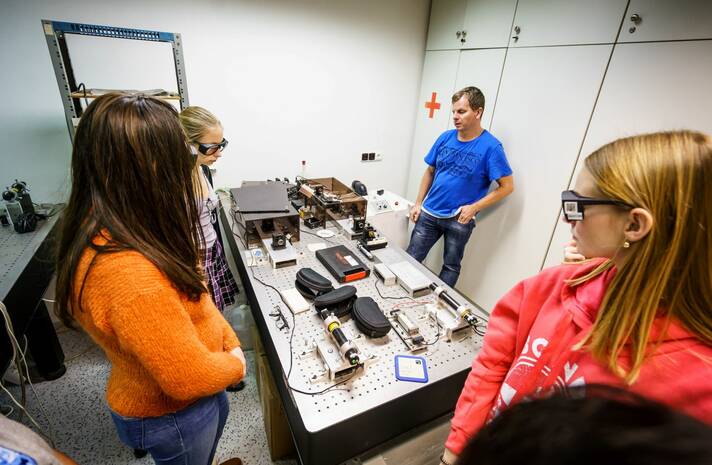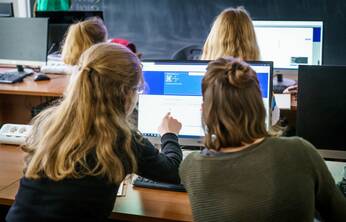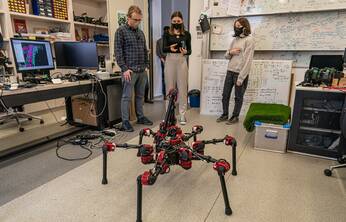In 2021, according to the Czech Statistical Office, female scientists made up only 31 percent of the total number of people working in domestic research. This puts us below the average in the European Union. In the natural and technical sciences, the situation is even worse. As the National Contact Centre for Gender and Science, which is part of the Institute of Sociology of the Czech Academy of Sciences, points out, in the natural sciences in 2020, the share of women was around 25 percent, and in the technical sciences only around 15 percent.
A number of factors are to blame for the lack of women in research, including the often-persistent stereotypes and the imaginary division of fields into "male" and "female". Breaking down these prejudices and giving high school girls the courage and desire to choose to study science and engineering is one of the main goals of the Become a Woman Scientist for a Day event.
Richer programme and new topics
According to Dr. Jaroslava Óbertová, scientist and main organizer of the event, this year's programme will be richer again compared to last year. The scientist, who works on theoretical physics at the FNSPE CTU, pointed out that high school students have 13 exercises to choose from, four more than last year.
"This year, the Department of Dosimetry and Application of Ionizing Radiation has joined the event. It offers three exercises on various topics in dosimetry as well as one morning lecture by Dr. Thinová. Another new exercise is on cosmic rays," Óbertová described. She said the organising team tries to vary the programme a little each year and bring in new topics. Óbertová recalled that last year's cooperation with FEE CTU, for example, enriched the event with robotics and programming. "I think that this is one of the reasons why we managed to attract a record number of female students to the previous edition," said Óbertová. Last year, 80 female high school students registered for the event, although slightly fewer of them came to the programme itself. "It is clear from their feedback that this type of event focused on girls and technology makes sense," the scientist emphasized.
Students get a glimpse into the worlds of particle physics and energetics
The morning will include a trio of lectures on particle physics, energetics and dosimetry. The participants will listen to them in the building of the FNSPE CTU in Prague's Břehová Street.
"If you want to talk about the origin and effects of ionizing radiation, its positive and negative sides, where we encounter radiation of this kind and how we can use its effects to our advantage and on the other hand protect ourselves sufficiently from it, come," said Dr. Lenka Thinová from the Department of Dosimetry and Application of Ionizing Radiation at FJFI CTU. In addition to teaching, Thinová works on projects related to the environment. "My work is a combination of field measurements and data processing. Solving different problems necessarily grabs you by the heart, especially if you measure in interesting areas such as caves, the surroundings of Temelín, Etna in Sicily and many others," the scientist said.
Šárka Jablonská, a PhD student from the Department of Economics, Management and Humanities at the FEE CTU, will talk about the challenges in the gas industry. The scientist and analyst deals with the currently highly debated topic of replacing natural gas with hydrogen. The third lecturer is Monika Robotková, a PhD student from the Department of Physics at FJFI CTU. Robotková studies proton collisions at the RHIC accelerator at Brookhaven National Laboratory in the USA
An opportunity for questions and experiments
The midday will be devoted to a discussion with scientists from both faculties. In addition to Šárka Jablonská, it will be attended by mathematician Professor Edita Pelantová, physical chemist Dr. Alena Zavadilová, both from the FNSPE CTU, and Radka Vozábová, a PhD student from the Department of Physics at the FNSPE CTU. Then the exercises will begin under the guidance of experienced female scientists, PhD students and lower year students from the participating faculties. This part will take place at various academic departments within Prague.
In the scientific workshops, high school students will, for example, get a feel for the basics of programming in Python, make solar lamps and visit the laboratory for testing photovoltaic systems at the FEE CTU. Other exercises will introduce the students to the topic of programming on the quantum computer IBM - Q and Modulo - a mathematical tool that simplifies calculations with large numbers.
High school students will be introduced to the world of robots by the exercises of PhD student Jindřiška Deckerová from the Department of Computer Science and the Artificial Intelligence Center at the FEE CTU. "This problem is called the business traveller problem and I am focusing on its application in robotics," Deckerová described her research. "And it's this application that participants can try out in an exercise where they will plan and program a mission for a walking robot. The robot will be tasked with obtaining soil samples from a planet that may harbour life," the scientist said. All exercises will end no later than around 5pm.
Programme and information about speakers can be found at: https://www.fjfi.cvut.cz/cz/media-a-verejnost/akce-pro-stredni-skoly/vedkyne
More photos from some of the past years can be found on the CTU website: https://media.cvut.cz/cs/foto/20200211-stan-se-na-den-vedkyni




